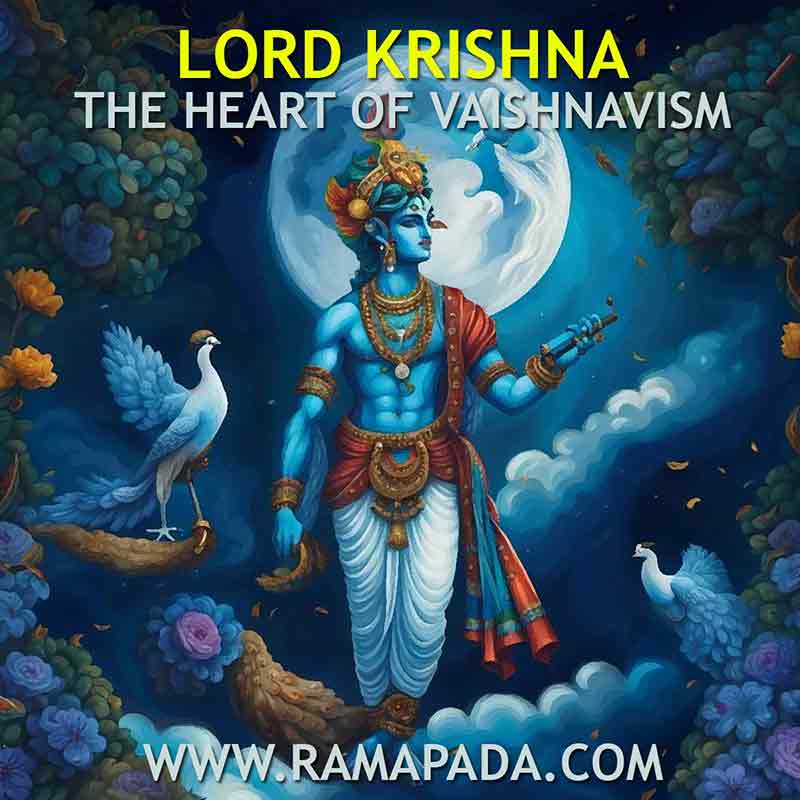Lord Krishna, the embodiment of divine love and playfulness, the radiant blue-skinned deity with a playful smile and a peacock feather crown, is a central figure in Hinduism and the very essence of Vaishnavism, one of its major traditions. Vaishnavism has profoundly influenced Indian art, literature, and social life. From the majestic temples dedicated to Vishnu and Krishna to the soulful poetry and music extolling their virtues, Vaishnavism continues to be a vibrant spiritual path for millions around the world
Vaishnavism: Devotion to the Supreme
Vaishnavism revolves around the worship of Vishnu, the preserver god, and his avatars (incarnations). Vishnu descends to Earth multiple times to restore balance and righteousness whenever needed. Krishna, revered as the most captivating and complete avatar, is believed to be the Supreme Being himself. Vaishnavism is one of the most widespread and influential denominations within Hinduism. It centers around the worship of Vishnu, the preserver god, and his numerous avatars, particularly Krishna and Rama. Estimated to comprise over 65% of Hindus globally, Vaishnavism offers a diverse theological landscape where devotion (bhakti) reigns supreme.
At the Core: Vishnu and His Avatars
Vaishnavas revere Vishnu as the supreme being, the all-pervasive force that sustains and protects the universe. Vishnu’s benevolence is manifested through his avatars, divine incarnations that descend to Earth at times of crisis to restore dharma (cosmic order). The most revered avatars include Rama, the ideal king, and Krishna, the embodiment of divine love and playfulness.
A Spectrum of Beliefs
While the core tenets bind Vaishnavism together, a rich tapestry of sub-sects and philosophies flourishes within it. Some prominent examples include:
- Sri Vaishnavism: This South Indian school emphasizes Vishnu’s consort, Lakshmi, and sees the world as real, existing in a harmonious relationship with the divine.
- Madhvacharya Vaishnavism: Founded by Madhvacharya, this school posits a dualistic reality, with God, souls, and the material world existing eternally separate.
- Gaudiya Vaishnavism: This school, popularized by Chaitanya Mahaprabhu, emphasizes ecstatic devotion (bhakti) through chanting and devotional practices.
Practices and Rituals
Vaishnava traditions emphasize various practices to cultivate devotion. These include:
- Murti puja: Worshiping deities through images or murtis in temples or homes.
- Japa: Chanting mantras, particularly the sacred names of Vishnu or his avatars.
- Kirtan: Singing devotional hymns, often accompanied by music and dance.
- Seva: Selfless service to the deity or the community.
Krishna’s Alluring Presence
As per the best astrologer in Kolkata, From his playful childhood pranks stealing butter to his role as the wise counselor guiding Arjuna in the epic Bhagavad Gita, Krishna embodies various aspects of the divine. He is the protector, the friend, the lover, and the embodiment of pure love (bhakti). Vaishnava theology explores Krishna’s divine lilas (playful acts) and emphasizes the path of devotion as the means to liberation.
Many Paths Within Vaishnavism
While Krishna is central, Vaishnavism encompasses diverse practices and philosophies. Some prominent schools include:
- Vishishtadvaita: Founded by Ramanuja, this school sees Vishnu as the ultimate reality and all souls as dependent on him.
- Dvaita: Madhvacharya established this school, which proposes a dualistic reality of God and individual souls.
- Shuddhadvaita: Vallabhacharya’s school emphasizes Krishna’s grace (pushti) as the sole path to liberation.
- Krishnaism: This term refers to traditions that view Krishna as the Supreme Being, independent of Vishnu.
Bhakti Yoga: The Path of Devotion
Vaishnavas practice Bhakti yoga, the path of devotion, to cultivate love for Krishna. This can involve chanting his names (Hare Krishna), singing devotional songs (kirtans), offering selfless service (seva), and studying scriptures like the Bhagavad Gita and Bhagavata Purana.
Krishna’s Enduring Legacy
Lord Krishna’s message of love, duty, and the importance of selfless action continues to inspire millions across the globe. Vaishnavism, with its diverse expressions of devotion, offers a path for each individual to connect with the divine through the enchanting figure of Lord Krishna.

